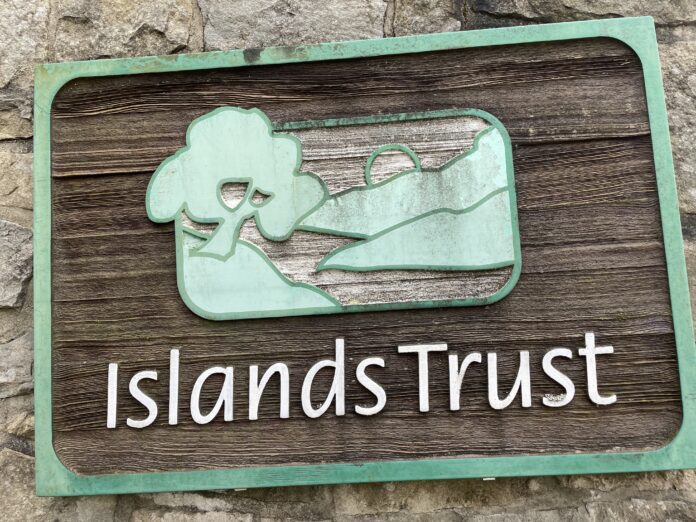Officials on Salt Spring have dropped proactive enforcement against short-term vacation rentals (STVRs), ending a prioritizing policy in place by standing resolution, in one form or another, since 2007.
As the island’s Local Trust Committee (LTC) rescinded its most recent standing resolution on STVRs Thursday, April 11, trustees lamented “confusing” bylaw regulations surrounding them — and the Islands Trust declined comment on whether future policies will be influenced by a recent adjudicator’s order exonerating a long-time bed-and-breakfast operation.
According to bylaw compliance and enforcement manager Warren Dingman, staff will default to responding to written complaints on STVRs only — which are infrequent, a report says, as STVRs generate little concern from their neighbours.
Dingman suggested limited staff resources should be expended on operations that do.
“The recommendation right now is to rescind the original standing resolution, and basically let us get on to other work,” said Dingman.
“I believe we’ve done all the work that we can through a proactive campaign for short term vacation rentals.”
Dingman said his records currently showed 83 open enforcement files, with 229 closed since 2007 following an extensive review of online Airbnb and VRBO listings. Moreover, he said, the maximum number of total ads has never exceeded 250, and according to his report the number of confirmed unlawful operations has always been less than 100.
“We’d be down to a ‘core group’ where a lot of them don’t have owner-operators on the property,” said Dingman. “The ones that are of the most concern, I believe, to the Local Trust Committee and the local community, those files would still be pursued. But any new STVR files would be pursued by a complaint only.”
In late 2023, according to Dingman’s report, more than 50 STVR files were closed and the remaining operations identified as unlawful were issued bylaw violation notices; in the first three months of 2024, seven compliance agreements have been signed by STVR operators.
“This indicates that the great majority of operators are willing to comply with the regulations in the Land Use Bylaw,” Dingman wrote, “when the evidence is provided that they are unlawful.”
Current land use regulations prohibit STVRs, but conditionally allow bed-and-breakfast operations in some island zones, subject to several conditions which local operators and the Salt Spring Accommodation Group have said are interpreted unevenly.
On April 3, an adjudicator upheld a challenge from owners of Salt Spring’s Blue Ewe B&B — disputing their third bylaw violation notice since 2022 — finding the contravention of bylaw had not occurred as alleged by the Islands Trust, and ordering the latest notice be cancelled.
Blue Ewe had been issued, and had disputed, two similar notices previously, with one ultimately cancelled by a different adjudicator and the second withdrawn prior to the hearing.
During discussions April 11, Salt Spring Trustee Laura Patrick said she didn’t know if rescinding proactive enforcement “100 per cent” was the solution, or indeed sent the right message, although she ultimately voted in favour of doing so.
Noting the importance of vacation rental businesses that “help someone stay in their home,” Patrick said she was sympathetic, adding she felt the “confusing” rules were largely to blame for the frustration bylaw enforcement was facing.
“It’s actually part of our affordable housing approach, where someone needs that income to afford their mortgage,” said Patrick. “The cost of living on the island is really huge, so [these are] really the people that I’m willing to turn a blind eye to right now, while we work out fixing our approach to vacation rentals.”
Patrick successfully added language to the motion to rescind — over the objections of trustee Jamie Harris — specifically asking staff to report back on “further consideration on proactive management” of STVRs in March 2025.
While that timing would likely coincide with the LTC’s annual March 31 opportunity to opt into B.C.’s Bill 35 — which would, if taken, establish a provincial role in STVR regulation on Salt Spring Island — Harris said it was “muddying” an otherwise straightforward decision.
“In a year, if we want to revisit, we can just do that,” said Harris. “The public understands that the LTC can revisit this whenever the heck we want.”
“There’s a lot of conversation about vacation rentals on this island,” said Patrick. “By putting this deadline in here, this doesn’t commit us to anything, it just helps the optics by saying, ‘we’re paying attention to this too.’”
Over the years, Salt Spring’s LTC has passed multiple resolutions to guide staff in prioritizing bylaw enforcement when it comes to STVRs “given finite resources available” — although those instructions have evolved, notably in 2017 when the word “proactive” was added to emphasize less reliance on complaints, and in 2019 when “not managed by a person available 24/7 on Salt Spring Island” was removed from the list of characteristics that might trigger a bylaw enforcement action.
The rescindment April 11, unlike those previous, was not immediately accompanied by a replacement resolution.

